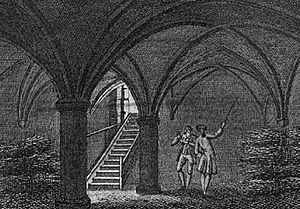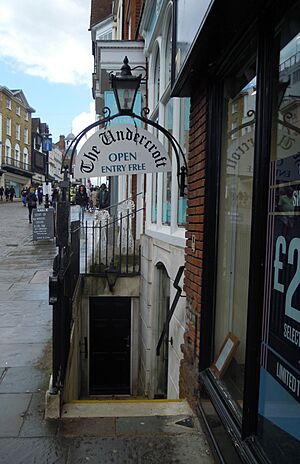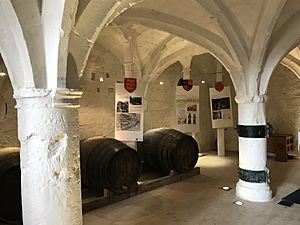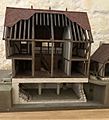The Undercroft, Guildford facts for kids
Quick facts for kids The Undercroft, Guildford |
|
|---|---|

Print showing the Undercroft as it appeared in the 18th-century
|
|
| Type | Undercroft |
| Location | 72/74 High Street, Guildford, Surrey |
| OS grid reference | SU 99676 49427 |
| Built | 13th century |
| Official name: Medieval undercroft at 72/74 High Street | |
| Designated | 27 August 1976 |
| Reference no. | 1005924 |
|
Listed Building – Grade II*
|
|
| Official name: 72, 74, 76 and 78, High Street | |
| Designated | 1 May 1953 |
| Reference no. | 1180242 |
| Lua error in Module:Location_map at line 420: attempt to index field 'wikibase' (a nil value). | |
The Undercroft is a really old storage room in Guildford, Surrey. It's located at 72/74 High Street. People say it's one of the best examples of its kind in England! Since 1976, it has been a special protected building. It's called a Grade II* listed building and a Scheduled Monument. This means it's very important to history.
What is an Undercroft?
An undercroft is like a basement or a storage room. In the Middle Ages, wealthy people built them under their houses. They were made of stone, which meant they were safe from fire. This was important for storing valuable things.
People used undercrofts to keep food, drinks like wine, or other precious items. Because they were under the house, the owners could keep an eye on their goods. Even if the building above was destroyed, the stone undercroft often survived.
Guildford has about half a dozen medieval undercrofts. Building them was expensive because they used lots of stone. This shows that Guildford was a rich town during the Middle Ages.
The Guildford Undercroft

The Undercroft in Guildford was built in the late 1200s. It probably belonged to a rich merchant. This merchant might have sold wine or fancy fabrics like silk. The Undercroft is about 10 meters long, 6 meters wide, and 3 meters high.
Its ceiling is a special type called a rib vault. This ceiling is supported by two round columns in the middle. Look closely at the walls! You'll see carved faces called corbels. These carvings help support the arches of the ceiling.
One corbel shows a woman's head wearing a wimple. A wimple was a popular head covering for women in the late 1200s. The Undercroft's ceiling is actually above street level. This allowed for a large doorway and steps leading down from the High Street. This suggests it was originally a shop.
A low window on the uphill side let in some daylight. In the far corner, a narrow doorway led to a spiral staircase. This staircase went up to the house above. This also supports the idea that the Undercroft was once a shop. The original house above was made of wood, but it's gone now. The red brick building you see today was built in 1803.
History and Use
From the 1300s onwards, the Undercroft was mostly used for storage. For much of the 1900s, it was empty. But in 1989, the old street entrance was reopened. The room was then fixed up to become an Information Centre for visitors to Guildford. The Information Centre has since moved to a new location.
Today, the Undercroft is looked after by the nearby Guildford Museum. You can visit it on Wednesdays and Saturdays from May to September. It's open from 2 PM to 4 PM on Wednesdays and 12 PM to 4 PM on Saturdays. From October to April, it's open on Saturdays from 12 PM to 4 PM. Entry is free! Just remember, there are steps from the street, so it's not easy for everyone to access.
Images for kids
 | Sharif Bey |
 | Hale Woodruff |
 | Richmond Barthé |
 | Purvis Young |










